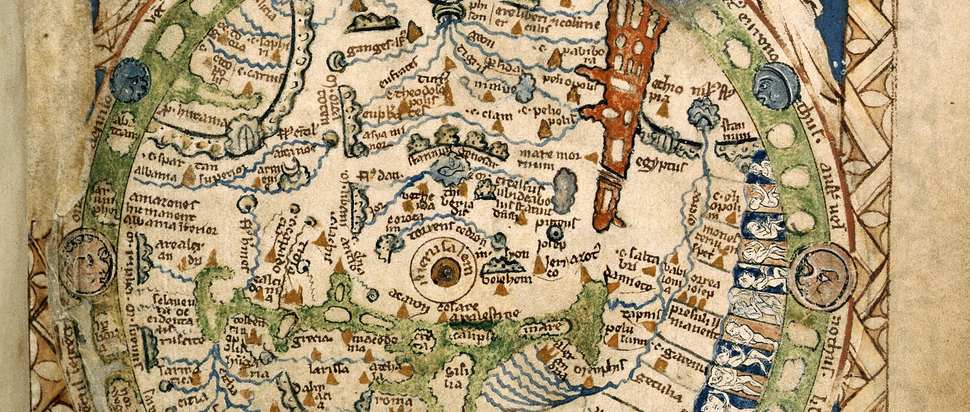The (Un)Holy Land: Adania Shibli's Minor Detail
In its recent deplatforming at Frankfurt Book Festival, Adania Shibli's Minor Detail has come to represent many of the contradictions of Western attitudes to the Middle East. We revisit the book in the wake of the bombardment of Gaza
In Western medieval cartography, Jerusalem sits at the centre of the world, a locus around which everything else clusters. The leading ideology of the time was Christianity, and so the heart of Christianity – the land of the New Testament, where the Son of God upended the temples and held his last supper – lies at the heart of the map. And at the edges of the map, and in manuscript illuminations, and in accounts written within these manuscripts, and in the bloodshed of the Crusades, the people that live there are monstrous – dark and otherworldly, leering with violence and malcontent.
The Middle East has always held this particular tension in the Western imagination – a cradle of civilisation and barbarism, the holy and profane land. The contradiction ran bright like a fever through the first academic interventions into the region, when the Orientalists translated The Thousand and One Nights with barely concealed contempt for the desires, customs, and mythologies of the land, and barely concealed hunger for the women woven through the stories. It scaffolds the West’s museums, that spill over with plundered objects that speak to such a rich history, but if only we see it over here, where it is safe and looked after. An imaginary place, this collection of diverse countries; where the West hunts for oil and sets family trees alight, where the hymns are sung and the cities are razed. Once in Royal David’s City. O Little Town of Bethlehem. I’ve been to Bethlehem. It’s strung in barbed wire.
In Adania Shibli’s novel Minor Detail – a book recently deplatformed from an award at Frankfurt Book Fair in the wake of the bombardment of Gaza, seemingly for the crime of being Palestinian – this question of maps re-emerges. A woman from Ramallah becomes obsessed with a narrative told in the first half of the novel, a true account in which a young Arab woman was captured by Israeli soldiers in the year following the Nakba, raped, and buried in a shallow grave. Unable to shake off this historic footnote, the unnamed narrator sets across occupied Palestine on a falsified identity card to discover the truth of the tale. She takes with her a stack of maps: a contemporary one showing Israeli infrastructure, and an older one showing Palestine before the 1948 Nakba. She picks the latter up, only to discover clusters of Arab villages that “on the Israeli map appear to be swallowed by a yellow sea.” She snaps it shut in horror.
Reminiscent of the dispassionate lucidity of Albert Camus’ The Stranger, Shibli’s Minor Detail is a masterful examination of legacies of violence and the cyclical nature of dispossession. Airless in tone, clipped in emotion, unnerving in the banality of what it shows, it is also deeply, profoundly unequivocal in naming the conditions under which its characters exist. Bereft, in many ways, of language – road signs in Arab country written over in Hebrew, greetings made in English to disguise ethnicity – Shibli affords her characters the unflinching clarity of what they are enduring. Occupation. Bombs. Checkpoints. Guns.
It is, in short, a book entirely predicated on the facts of the Israeli occupation. And in this light I find myself bewildered, for if acknowledging the occupation is inherently taboo, what version of the book did the festival judges read when they initially determined to award it a prize? But perhaps I should have remembered the old maps, the ones from long before the Nakba; Jerusalem in pride of place while wars raged within. Deplatforming Shibli was an act of moral cowardice, but it also sits proudly within this centuries-long Western tradition. The Middle East to be celebrated, until there are stakes. Palestinian writers to be revered, until they are not. The complexities of decolonisation to be canonised, until serious fractures within the colonial project demand actual dissent.
The unnamed narrator in Minor Detail cannot escape this minor detail of history because for her, and for Palestinians everywhere, the violence of the Nakba never ended; it is an ongoing process of dispossession – seen with undeniable vehemence in the events of the past two months, in which an entire Palestinian territory is once more being erased. But for the West, who can dabble in programmes and prizes without ever taking a position, these minor details become the only imagination of the Middle East that it has. We exist in a state of perpetual aftermath – something to be mourned and fretted over only after the fact.
“They’re only interested in us when we’re dead,” my friend tells me, three weeks into the bombardment. “They want us to die, so they can write their papers.” A body, a statistic, a synecdoche of what Edward Saïd termed this forever state of geographical violence: land stolen, bombed to shards and dust, living in exile while they dig amongst the rubble for their decolonisation seminars and diversity prizes. Alive, we hold very little interest, and no value. And so the year turns, and the holiest week approaches, and we sit within this space of slow death, waiting to become anything. A minor detail, an anecdote, residue smeared across the history books, when it is too late to say anything at all.
